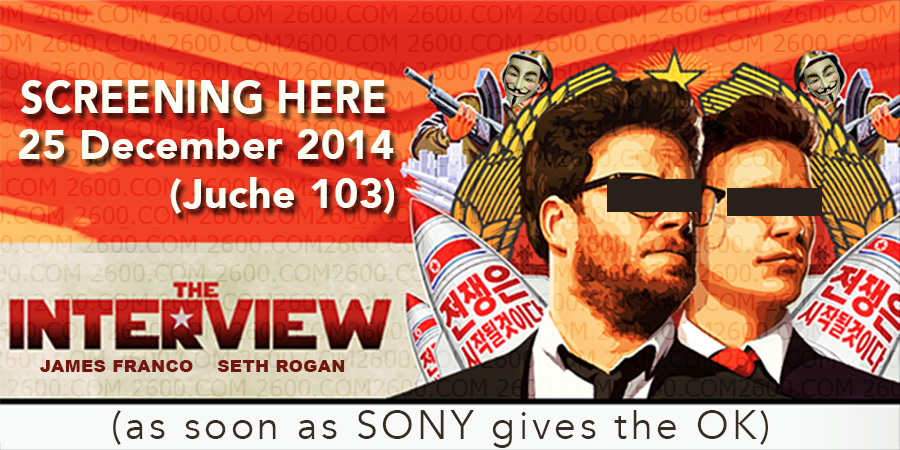
The Hacker Quarterly
NOW ON STANDS!
Current issue: WINTER 2025-2026
You've probably been hearing quite a bit about hackers recently. According to the mass media, hackers have been holding Hollywood hostage, are working for the North Korean government, and are basically equivalent to terrorists. Some of this we've heard before and some is just completely out of left field. As one small part of the vast and diverse hacker community, we felt compelled to not only say something, but to do something.
First, let's clear one thing up: We have little remaining ill will towards Sony for their part in the MPAA lawsuit against us in 2000, when we were hauled into federal court for publishing a computer program that would allow Linux users to view DVDs. We learned a valuable lesson about corporate America, the government, and the power of the Digital Millennium Copyright Act. We saw how the media could be so easily manipulated by the powers that be. And, while we lost the case, we became the first actual victims of the DMCA, and had the privilege of being the ones to warn the rest of the country what was ahead. That fight has been going on ever since. And Sony played a valuable role in motivating us. We thank them for that.
As hackers, we have a strong commitment to freedom of speech, which we regularly express through our magazine, our radio shows, our conferences, and any other medium we can get our hands on. Most in the hacker world share in these very basic values.
We've protested films in the past when they've been unfair to the hacker community. It tends to freak out those in power when they realize hackers are angry at them, but most of those fears are based on paranoia and ignorance as to what the hacker community is really all about. And cutting off speech, silencing unpopular views, and avoiding controversy are not what we're about.
As you have undoubtedly heard, Sony has decided to cancel the release of their controversial film "The Interview." They've done this because of a single, vague threat that is tantamount to something we've all seen at one time or another on an IRC channel and not thought twice about. By focusing on this threat, however, Sony can attempt to extricate itself from the controversy and the immensely stupid movie plot it agreed to produce - and blame the whole thing on hackers, albeit North Korean ones. (They might also escape liability for their inadequate computer security by claiming the massive compromise of their systems was equivalent to a terrorist act. But that's another story, or possibly a whole new movie.) In their gross generalization, and with the help of the mass media, the entire hacker community is being painted with a very broad and dark brush.
We have decided to call their bluff. To demonstrate that hackers have no interest in suppressing speech, quashing controversy, or being intimidated by vague threats, we ask that Sony allow the hacker community to distribute "The Interview" for them on the 25th of December. Now, we're aware that Sony may refer to this distribution method as piracy, but in this particular case, it may well prove to be the salvation of the motion picture industry. By freely offering the film online, millions of people will get to see it and decide for themselves if it has any redeeming qualities whatsoever - as opposed to nobody seeing it and the studios writing it off as a total loss. Theaters would be free from panic as our servers would become the target of any future vague threats (and we believe Hollywood will be most impressed with how resilient peer-to-peer distribution can be in the face of attacks). Most importantly, we would be defying intimidation, something the motion picture industry doesn't quite have a handle on, which is surprising considering how much they've relied upon it in the past.
We sincerely hope Sony doesn't refuse this offer because of the potentially bitter irony of having hackers show them how to run their own industry. Perhaps if they had spent less time in court and more time learning to stand up for the values they allegedly hold (not to mention installing a little security on their systems and protecting the privacy of their employees and associates), this little bit of drama might never have had to happen. But then, where would Hollywood be without drama?
Even more vital than ensuring that the public gets to experience (and judge) art for themselves is the need for hackers to show their true colors. These are not the colors of terrorists, bullies, or government agents, but rather those of creative individuals who can cause all kinds of mischief and, in the process, come up with unique solutions and ingenious ways of preserving freedom. We believe it's the latter category that really scares those in power and is likely at the heart of all of the wild fear-mongering we're hearing today. Failure to correct these misconceptions now could easily assure future crackdowns that will affect all of us.
We will be preparing a section of our website for screening of "The Interview" on December 25th. If Sony agrees, we will work our asses off to make this happen. If they don't give us permission to do this, then we will point to any sites that have managed to obtain the film. The address to write to for anyone from Sony, North Korean officials, hackers around the world, or the general public is interview@2600.com.
Censorship and fear must be fought at every opportunity. We made that point while opposing Sony in the past. Now we must make that point again, this time for their benefit.
